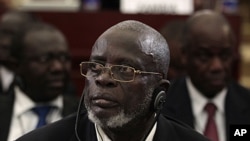The death of Guinea-Bissau’s President Malam Bacai Sanha is a blow to the country's troubled, fragile democracy. The funeral on Sunday could signal the start of yet another tumultuous political period.
President Sanha had brought relative peace to Guinea-Bissau since his election in July 2009 - following the assassination of his predecessor Joao Bernardo Vieria.
Now it’s feared Sanha's death will bring on a new era of instability and violence. Opposition parties are already rejecting National Assembly leader Raimundo Pereira as interim president. But talking in the capital, Bissau, National Assembly cabinet head Carlos Fonsecka Rodriguez said Pereira is simply following the constitution.
"The Guinean constitution is clear, that if the president dies, the president of the National Assembly automatically takes over until an election is held," he said.
Ansoumane Sanga, the justice advisor to Pereira, says he hopes an election will take place within 60 days.
"All parties should work together to bring about the election, he says, mentioning a boat on turbulent seas where everything gets mixed up," he said. "Now, he says, authorities can navigate the country into normality.
Power struggles between the military and government have shaken Guinea-Bissau for the last three decades. Most recently, a group of soldiers staged a coup attempt on December 26th.
The army is today on high alert - but Bissau residents say the last thing they need is military intervention. 30 year-old Richard Antwi is a priest in the capital.
“It’s happened before; it happens all the time," said Antwi. "One problem with the military is professionalism. They need to be trained to know that their job is to stay in the barracks. They have nothing to do with the political system. Yes, they are there to protect and defend the country, but not to intervene and take power.”
In Bissau, flags are flying at half-mast to mark the seven-day mourning period preceding Sanha’s funeral on Sunday. But there is a palpable sense of fear of what is to come. Wanya Tiero is a student.
“This is Bissau and every comment you make about the military can cause you a lot of problems - you understand," said Tiero. "There is a lot of confusion about the military and their involvement with the politics of the country. We are a bit afraid. We are hoping that what happened in other countries will not happen here. There is a feeling of fear mixed with a lot of hope for this country.”
Constant political turmoil has meant the population has battled with unpaid wages, closed schools and scant foreign investment. Guinea-Bissau has also become a hub for drug-trafficking between Latin America and Europe.
Thirty-two- year-old Bineta Piero, a maid and student in Bissau, says people will look back fondly on the brief Sahna years.
"Guineans will mourn Sanha and the stability he brought," said Piero. "We are fed up of gunshots. Other countries want to help, but we are afraid that if all they see is gunshots, they will stop helping."
President Sanha died this week in a Paris hospital after suffering from a prolonged, undisclosed illness. He was 64.
Guinea-Bissau Mourns President
- By Jane Labous




